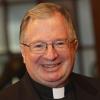The picture was perfect. Four patriarchs of the Maronite, Melkite, Syrian Orthodox and Syrian Catholic churches with the catholicos of the Armenian Apostolic Church sat side by side on the stage on Thursday in Washington at the In Defense of Christians Inaugural Summit. More remarkable was the coherence of the patriarchs' message: Not just Christians, but all religions of the Middle East, including Islam and Judaism, need protection. The future of the region, they declared, must be found in pluralism and inclusion.
The Syrian Catholic patriarch, Ignatius Joseph III Younan, held out Lebanon as a model of religious pluralism. Ignoring Lebanon's troubled past, including its 15-year-long civil war, he spoke about the respect enjoyed by all religions made possible by the separation of church and state.
The Armenian catholicos, Aram I Keshishian Religious, argued that pluralism makes possible "peaceful coexistence" between people of different faiths and between minority and majority sects of one religion.
"Extremism," he said, "rejects pluralism and the right to be different."
Several speakers insisted that common citizenship, not one's religion, should be the basis of inclusion in political communities.
The unanimity of the patriarchs stood in sharp contrast to Texas Sen. Ted Cruz's divisive keynote address Wednesday evening. Cruz made support for Israel a litmus test for American support for Middle Eastern Christians.
Christians have no better ally than Israel, he told the audience of largely Arab Americans. After his comment was met with boos and catcalls, he left the stage, repudiating the audience, "If you will not stand with Israel, if you will not stand with the Jews, then I will not stand with you."
Members of the audience responded that calls made by many speakers for respect for Jews and their inclusion in a pluralist Middle East had met with wide approval. It was Cruz's assertion that Israel was an ally of Middle Eastern Christians to which they objected. They said they felt that their effort to build a coalition had been hijacked for the sake of Cruz's political ambitions and the ultra-Zionist cause.
The insensitivity of the event's planners to Israel's role in Christians' disappearance from the Holy Land was underscored by the late inclusion of Rateb Rabie, president of the Holy Land Christian Ecumenical Foundation -- of which one of the authors of this blog post, Fr. Drew Christiansen, is a co-founder -- to speak on behalf of Palestinian Christians. Rabie noted how the percentage of Christians in contemporary Israel has declined from 20 percent of the population at the time of Israel's founding to 1.5 percent today.
Several speakers spoke of the contributions Christians made to the common good of their societies. Nermien Riad, executive director of Coptic Orphans, discussed the goodwill Christian organizations win from their fellow citizens through their institutions. She made special note of Catholic schools and the work of Catholic Relief Services.
The need for protection for Christians and their heritage has never been greater, but the cause has now been obscured by the fight against the Islamic State as matter of collective security. Other elements of protection for uprooted Christians are ignored, particularly their need for return and resettlement in their homelands and, as they await return, for asylum in third countries.
The summit has a real possibility of serving as the foundation for a collective voice for religious liberty in the Middle East and support for Christianity there. But to do so, organizers must overcome the temptation to join a religious and human rights cause to right-wing American politics, a problem illustrated by the choice of Cruz as a keynote speaker for the summit's main event.
Work needs to be done as well to build mutual understanding between evangelical Christian activists and members of the hierarchical and liturgical churches of the Middle East. Like the selection of Cruz, the choice of the culture critic and religious liberty activist Eric Metaxas as a luncheon speaker seemed a misfit. Metaxas' sermon fell flat with a Catholic, Orthodox, Coptic and Armenian audience that didn't share his Calvinist belief in human depravity.
While evangelicals are movers and shakers in the religious liberty movement, members of the Eastern churches are wary of them: In Muslim countries, evangelical proselytism puts members of traditional churches at risk. They also resent evangelicals' "poaching" members from their churches. The future defense of Middle Eastern Christians and their rich cultural heritage depends on constructive dialogue between these two streams of Christianity.
[Jesuit Fr. Drew Christiansen is former editor of America magazine and a professor of ethics at Georgetown University. Ra'fat Aldajani is a Palestinian-American writer and commentator.]





